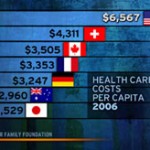 – I like to report on how health care works in other countries outside of the U.S.   I do this mostly for my U.S. readers who are constantly besieged by propaganda from vested interests in the U.S. that are attempting to convince them that what they have in the U.S. is the best that can be had.
– I like to report on how health care works in other countries outside of the U.S.   I do this mostly for my U.S. readers who are constantly besieged by propaganda from vested interests in the U.S. that are attempting to convince them that what they have in the U.S. is the best that can be had.
– Au contraire, mon ami.
– There’s an entire world of amazing health care options outside the insular U.S. In all the other advanced western nations, in fact.
– It is a world wherein people automatically expect that one of the functions of their national government is to provide health care for its citizens. Free.  And, if not free, then certainly easily affordable.
– Recently, in one of the on-line groups I participate in for immigrants (and wanna be immigrants) to New Zealand, a discussion started up about how health care in New Zealand works. One of those who spoke up had just been kidded (in a good natured way) about being a ‘Socialist‘ because she thought that the socialized medicine system here in New Zealand was a good thing.
– Here’s her reply just as she delivered it.  I love it and I think readers in the U.S. should be exposed to more information like this.
– To my friends in the U.S.: You do not live in the best of all worlds with respect to health care. And those who are trying to convince you that you do have serious financial skin in the game. The longer they can keep you convinced that the U.S. system is the best system, the longer their profit making streak runs hot.
– Seriously folks, you’ve got to get out there and smell the roses outside the U.S. borders. At a bare minimum, take a vacation to Canada and talk, seriously, to the Canadians you meet about their health care system – you will be amazed and shocked at how badly you are being treated.
= = = = = = = = = = = * * * = = = = = = = = = =
Hey there – Socialist???
Might take me a second to get use to the idea as I was raised that was a “bad” word. But guess what? If LOVING New Zealand health care makes me a Socialist, then a Socialist I am. I cannot say enough about how GREAT the health care here in Kiwi Land is, and as you know it is one of the main reasons we came here and one of the main reasons we stay here. Not only was all of my IVF treatment completely FREE of charge, all prenatal, birth and post op care (including the Plunket and Karitane nurses) was included. The Lactation Consultant in the hospital charged me $6 for a nipple shield and I had to buy my own toothpaste in the gift shop as I had an unexpected early admission prior to birth. We pay $37 for a visit to our GP. ANYONE can walk in off the street (even a visitor who has just arrived) and pay $50 to see my doctor and get the exact same medical care.
A PRIVATE eye specialist charged my husband $95 for the full and complete 45 minute glaucoma workup-medicine included. He goes yearly as his eyes are not bad enough to qualify for the hospital’s eye clinic but bad enough that we want to keep them from getting worse. And here a 45 minute Doctor consultation means you get to speak WITH the doctor one on one for up to 45 minutes. I could not believe how inclusive and involved the Doctors here are. As an American nurse I am use to docs flying in and out of patient rooms for 6 minutes and billing them for the hour. When I finally did get pregnant, I called up a SPECIALIST OB/GYN as I did not want to trust the delivery of my baby to a Midwife. They said it would be $1200 ALL INCLUSIVE for all prenatal, delivery, and post op care. Lucky for me I developed Diabetes before I could get in to see the specialist, so all of my care was transferred to Endocrine Gynecologists for FREE as public health pays for all complicated pregnancys.  There is a $6 charge for blood draws unless of course you are willing to walk your procedure form over to Med Lab (4 blocks away)-wait 5 minutes, and then it is TOTALLY and completely FREE.
Can’t go on enough and despite everything (both good and bad) that has happened to us over the years – the one consistent and GREAT thing that we have had is PREVENTIVE, low intrusive medical care. Unless you happen to work in the medical insurance business, I think you will find the care here far exceeds anything that I ever worked for or found in the United States. The idea of ever having to go back to an American doctor while in the United States sends chills up my spine. Here, I am a person and we are a family. There, I often felt like a lab rat. Relax – no one in true need of medical care would ever be denied treatment while waiting for a few pieces of paperwork to get sorted. The system is set up so that you would be covered under ACC as a visitor until you were covered.
Chanah Luppens
AKA Melissa Luppens RN BSN (an RN for 18 years in the U.S.)
Missouri Nursing Liscense
—– —– —–
– Here’s a glossary of some of the terms Chanah used here for those who are not in New Zealand or do not have a medical background and thus might not be familiar with them:
IVF -In Vitro Fertilization
Plunket – a (New Zealand) not-for-profit national organization whose people are passionately committed to supporting families and young children. We are the country’s biggest provider of Well Child/Tamariki Ora services. These include parenting advice and support, child health promotion and health education. They are offered to all New Zealand children and their family/whanau from birth to five years. Most services are completely free.
ACC – The Accident Compensation Corporation (ACC) provides comprehensive, no-fault personal injury cover for all New Zealand residents and visitors to New Zealand.
 – Another American Expatriate, Curtis Owings, here in New Zealand writes (below) about insurance and how it is a different experience from what folks in the U.S. know.
– Another American Expatriate, Curtis Owings, here in New Zealand writes (below) about insurance and how it is a different experience from what folks in the U.S. know. – I like to report on how health care works in other countries outside of the U.S.   I do this mostly for my U.S. readers who are constantly besieged by propaganda from vested interests in the U.S. that are attempting to convince them that what they have in the U.S. is the best that can be had.
– I like to report on how health care works in other countries outside of the U.S.   I do this mostly for my U.S. readers who are constantly besieged by propaganda from vested interests in the U.S. that are attempting to convince them that what they have in the U.S. is the best that can be had.  who will fight to the death to prevent any serious cost cutting, and it’s why Obama and the Democrats in Congress have largely chosen to buy them off instead.
who will fight to the death to prevent any serious cost cutting, and it’s why Obama and the Democrats in Congress have largely chosen to buy them off instead.